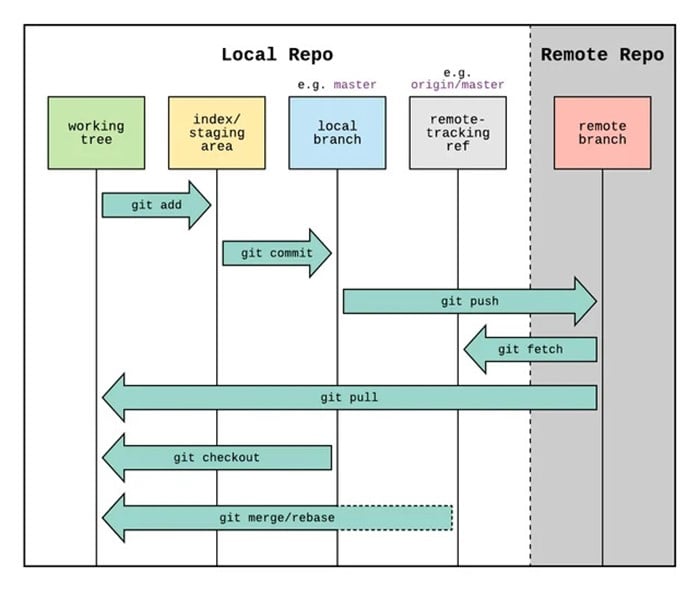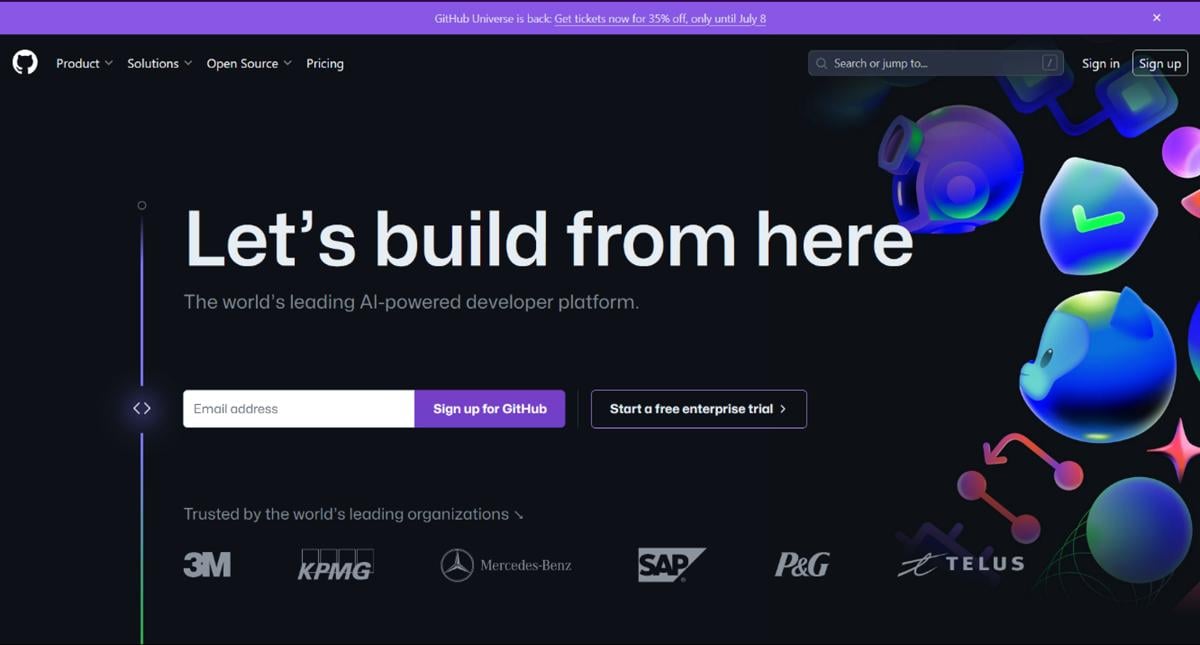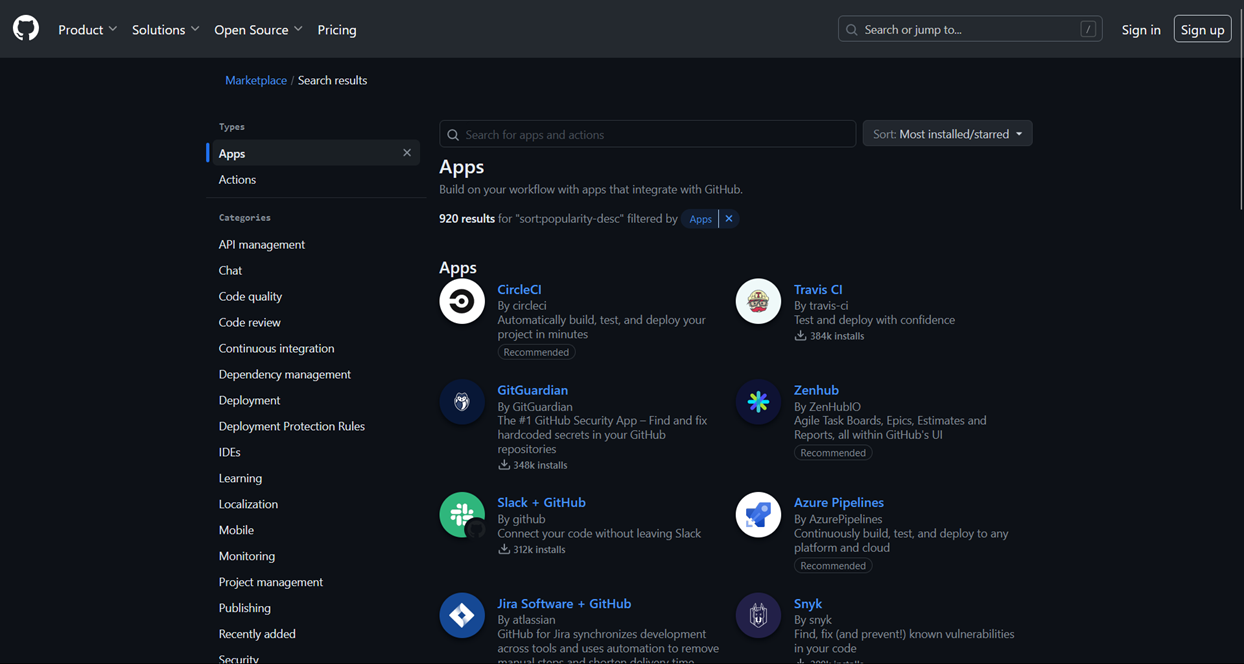What is Git?
Git is the most widely used, open-source version control system. Designed for Linux in 2005 by Linus Torvalds, Git has since become an essential tool for software developers working collaboratively on software development projects.
Using Git, developers can take snapshots of the current codebase version and compare it to previous versions, quickly and easily. These snapshots track even minor changes in code and other areas of the project, enhancing code quality and coding standards.
Git sits a step above other traditional version control systems due to the version branching that allows developers to work on different branch versions and manage them at the same time. Changes can be tested and merged into the main branch once a final version of the codebase is confirmed.
Git is open-source and can be used on personal servers for development. This is why tools like GitLab and GitHub both feature Git in their names. Git supports local and cloud instances, making it easy to develop software in-house or collaboratively with a team around the world.
This feature is one of the reasons Git version control systems have become so popular, as it allows developers to set up their own VCS servers without subscribing to a paid service. Cloud-based Git tools like GitLab and GitHub are commonly used to make working with large, remote teams easier.
Of course, GitLab and GitHub are full-service suites of tools that go beyond the simple Git functionalities.

What is GitLab?
GitLab is a version control software created in 2011 that uses the power of Git while providing a more user-friendly experience. GitLab uses a cloud-based repository and DevOps platform for testing, monitoring, and deploying code.
In the early days, GitLab was only a cloud-based repository but after gaining popularity, added many new security features and integrations. Originally open-sourced, GitLab now offers cloud-based premium plans as well as free SaaS plans.
GitLab also comes packaged with essential tools to help manage projects and monitor development teams using a DevOps architecture. Some of the key features of GitLab are:
- Code depositories imported from Bitbucket or Google Code
- Open-source repository platform
- Easy maintenance of server repositories
- Tools for time, milestone, and issue tracking
- Optimized UI and authentication features
- Secure branch protection and user permissions

Advantages of GitLab
Some of the major advantages of using GitLab are:
- Open-source licensing
- Self-hosting capabilities available for all plans
- Easy-to-use package distribution services
- Supported and maintained CI/CD lifecycle
- Easy code maintenance
Disadvantages of GitLab
There are a few areas where GitLab performs less than optimally, including:
- Slower interface
- Frequent bugs to manage throughout the software lifecycle
- Missing enterprise-level development features
- Common repository issues.
What is GitHub?
GitHub is repository hosting suite that uses the power of Git to provide a robust version control platform. As one of the largest source codes in the world, GitHub has amassed over 40 million users.
GitHub allows users to set projects to public so they can be edited and developed by anyone with a link to the project. Created in 2008, GitHub was also designed to make using Git version controller easier.
Along with the standard repository and version control features, GitHub also includes tools for documentation, tracking, and access to an in-depth wiki for new users. A cloud-based platform is used to help developers track and test code changes while giving the flexibility to use new integrations and applications available in the GitHub marketplace.
GitHub has an extremely active community of developers and users committed to improving the platform. Owned by Microsoft, GitHub is maintained by a team of 1600 employees with a main office located in San Francisco. Some of the key features of GitHub are:
- Project labels and milestones
- Easy branch comparison and complete comparison views
- Website publishing and hosting
- Syntax highlight
- Integration of third-party APIs

Advantages of GitHub
Some of the major advantages of using GitHub are:
- Easy documentation sharing
- Open-source codebase
- Repository framework searches
- Third-party integrations
- SVN, HG, and TFS support
- Paid and free plans available
Disadvantages of GitHub
There are a few areas where GitHub performs less than optimally, including:
- Lackluster REST and RESTful API development
- Expensive private repositories
- Lack of development tools
- Not a totally free tool
- Space limitations
GitLab vs. GitHub
When choosing the right version control software, it’s important to compare both GitLab and GitHub for a full view of the features offered. Although both utilize Git functionality, there are some key differences that should be noted before making a final decision.
Similarities Between GitLab and GitHub
The common features between GitLab and GitHub have been detailed in the table below:
| Feature | GitLab | GitHub |
| Git | Yes | Yes |
| Self-hosted Version | Yes | Enterprise Plan Only |
| Continuous Integration and Delivery | Yes | Third-Party Application Only |
| Wiki-based Documentation | Yes | Yes |
| Preview Code Changes | Yes | Yes |
| Issue Tracker | Yes | Yes |
| Code Review | Yes | Yes |
| Multiple Issue Assignees | Paid Plan Only | Only Public Repository |
| Project Management Boards | Yes | Yes |
| Team Discussions | Yes | Yes |
| Time Tracking | Yes | Third-Party Application Only |
| Security and Compliance Tools | Yes | Yes |
| Load Performance Testing | Paid Plan Only | Third-Party Application Only |
| Browser Performance Testing | Paid Plan Only | Third-Party Application Only |
| Iterations and Sprint Planning | Paid Plan Only | Third-Party Application Only |
| Issue Dependencies | Paid Plan Only | Third-Party Application Only |
Differences Between GitLab and GitHub
There are some major differences between GitLab and GitHub that may affect how effective each is for certain projects. Integration is an area with some significant differences, as GitLab is dedicated to continuous integration and DevOps workflows.
Using GitLab CI tools, code can be built, staged, and deployed automatically without the need for manual updates or custom integrations. This is great for those using PaaS solutions like Kubernetes.
CI/CD workflows can be set up using GitHub but will require third-party CI tools to work properly. This lack of integration can make using CI tools more cumbersome as they will not interact directly with the GitHub repository.
The workflows are also quite different when comparing GitLab to GitHub. GitHub focuses more on speed while GitLab focuses on reliability. GitLab workflows typically utilize an approach that involves creating multiple stable branches.
This means that the main branch is easily deployed or rolled back to previous versions. This type of workflow can be cumbersome for smaller teams, but it allows teams to work on new features without constant testing. It can be argued that this approach is more secure than GitHub.
There is also a significant difference in the packaging of these two version control tools. GitLab is a complete package platform while GitHub gives the users the flexibility to tailor the suite to their specific needs.
While GitLab offers some integrations like Asana, Jira, and Microsoft Teams, GitHub currently offers 374 free applications in their marketplace for integration. There are also many different paid applications that can be integrated into the platform.
That said, users looking for a product that works out of the box, GitLab is likely more suited. Features like CI, time tracking, and backups are included in the base version of GitLab, while these features are only available when using third-party applications inside GitHub.

For those interested in self-hosted private servers, GitLab allows users to host a private version of GitLab on their own virtual machines. This feature is locked to the Enterprise plans when using GitHub.
Plan pricing is the last major difference between GitLab and GitHub. Both offer free plans that come with unlimited public and private repositories, but higher tiers are priced differently.
GitLab offers a premium plan for $29/month and an ultimate plan for $99/month. This is a stark contrast to the $4/month team plan and $21/month Enterprise plan offered by GitHub. GitHub is the more affordable of the two, with the most expensive GitLab plan needed to mirror many of GitHub’s Enterprise features.
| Parameters | GitLab | GitHub |
| Authentication Levels | Allows for access and permissions to be set and modified easily. | Allows users to choose whether to give read or write access. |
| CI/CD | Offers built-in CI tools | Requires third-party application. |
| Import and Export | Offers documentation on how to import/export data from other vendors. | Does not provide documentation on how to import/export data from repositories. |
| Workflow | Emphasizes reliability. | Emphasizes speed. |
| Complete Platform | Package complete platform. | Users build their own platform using applications purchased/downloaded from the Marketplace. |
| Self-Hosted Private Servers | Available in free and paid plans. | Available only in paid plans. |
| Open Sourced | Yes | No |
| Project Analysis | Yes | No |
| Pricing | Free Premium - $29/month Ultimate - $99/month |
Free plan Team - $4/month Enterprise - $21/month |
Which Should You Choose: GitLab or GitHub
The choice between GitLab and GitHub can be a difficult one, considering they are both extremely popular with developers. GitHub is more popular but that does not mean it is the best option for a particular project.
While GitLab is the clear winner when it comes to out of the box functionality, GitHub offers many more integration options inside their Marketplace. Ultimately, the choice comes down to the project, team size, and overall goals.
When to Choose GitLab
GitLab is a better option for developers working on a private project. GitLab’s robust collection of tools allows for more control over user access. Self-hosting is also easier using GitLab, as GitHub uses cloud-based services. Self-hosting GitLab on a private server gives users more control over repositories and data.
For those looking for a powerful version control tool out-of-the-box, then GitLab is the better choice. Offering a wide variety of different tools and features including built-in CI/CD, tracking, and code review, GitLab does not require any third-party applications to be used to access these features.
When to Choose GitHub
GitHub is the better option when working on large, open-source projects. There is a large community of open-source developers working on GitHub making it the top open-source development platform in the world.
GitHub is also the best choice when it comes to affordability, offering unlimited private repositories in the free plans. Those who wish to tailor their own version control platform will likely benefit from GitHub’s marketplace, where hundreds of integrations and applications are available for free.
Developers working on commercial products will likely benefit from using GitHub over GitLab, as the higher tiered plans are significantly cheaper than GitLab’s.
Conclusion
Developers around the world have been using Git powered version control tools like GitLab and GitHub for years. These tools have become an essential part of the development process, ensuring that code is reviewed before launching.
Understanding the differences between these two platforms can help ensure the success of future projects, as both have their strengths and weaknesses.
For more information on GitLab or GitHub, contact us today!






